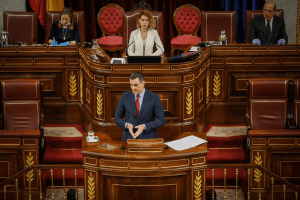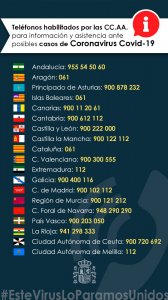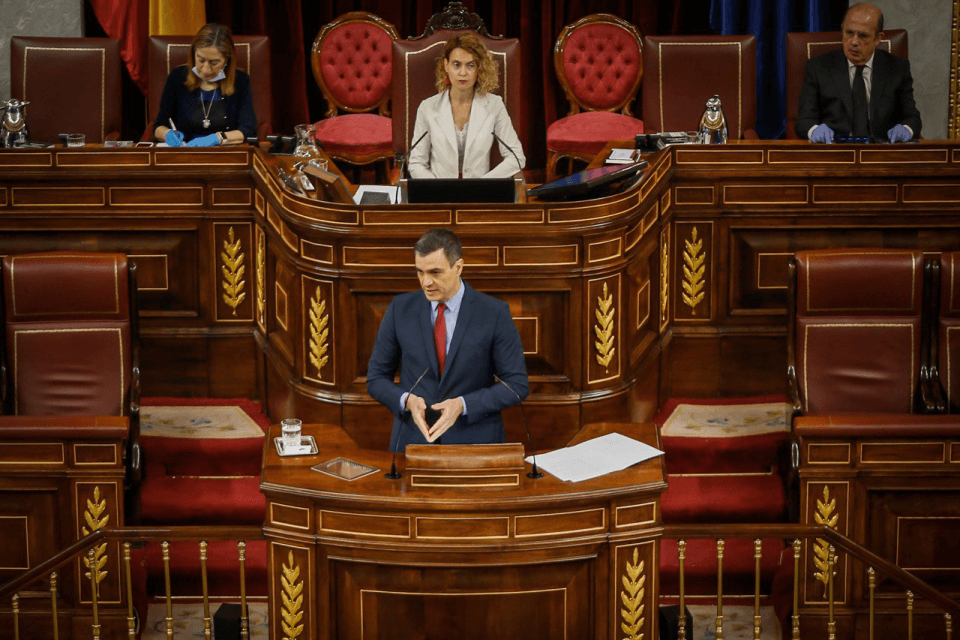Click here for today’s full report: Coronavirus in Spain (4 May)
ALSO READ: Lifting of lockdown in Spain – full details of all phases
Please support Spain in English with a donation.
Report below updated in Spain at 11.15h on Wednesday 22 April.
The latest official figures* released by Spain’s Health Ministry in Madrid at 11.15am on Wednesday 22 April confirm a total of 208,389 known cases of Coronavirus (Covid-19) in Spain, 4,211 more than yesterday.
Tuesday’s figure had seen an increase of 3,968 new infections compared to Monday. Monday’s figure had been an increase of 4,266 over Sunday. Sunday had been 4,218.
The current peak of recorded infections for a 24-hour period in Spain was on 31 March, when 9,222 new cases were registered.
21,717 people have now died from the pandemic in Spain, up by 435 on yesterday.
Tuesday had seen an increase of 430 Coronavirus-related deaths over Monday. Monday had seen an increase of 399, which was the lowest daily increase since 22 March. Sunday had been 410.
The current peak of recorded deaths related to Coronavirus in a 24-hour period in Spain was on 2 April, when 950 deaths were registered.
85,915 people have now made a full recovery, an increase of 3,401.
Of the official figures released by the Health Ministry today, 59,199 confirmed cases of Coronavirus are known to be in the Madrid region and where 7,464 have died (from the total 21,717 across the country).
There are now 43,802 cases in Catalonia and 4,247 deaths there. In Catalonia, however, there has also recently been a change in the method of collating data, so these figures could be higher (please refer to Health Ministry data and regional discrepancies below).
There are 13,044 known cases in the Basque Country (1,124 deaths), 11,610 in Andalusia (1,050), 17,321 in Castilla La Mancha (2,140) and 10,538 in the Valencia region (1,106).
Figures for those infected with Coronavirus in other regions* are as follows: Aragón 5,054 (656 deaths), Asturias 2,419 (211 deaths), Balearic Islands 1,836 (164), Canary Islands 2,094 (121), Cantabria 2,160 (167), Castilla y León 16,839 (1,554), Ceuta 118 (4), Extremadura 3,230 (404), Galicia 8,634 (368), Melilla 105 (2), Murcia 1,695 (123), Navarra 4,899 (401) and La Rioja 3,792 (298).
* Please see ‘Health Ministry data and discrepancies’ below. A full breakdown in Spanish of the data per region, together with age group statistics can be found by clicking here.

Please click to support Spain in English with a contribution
CORONAVIRUS in SPAIN
Spanish Congress debate
Spanish Prime Minister Pedro Sánchez is currently seeking approval in the Spanish Congress today (Wednesday) to extend the lockdown in Spain until 9 May, whilst also relaxing some of the restrictions to allow children the opportunity to leave the confinement of their homes.
On Tuesday evening, Spain’s Health Minister Salvador Illa appeared before the media to make a U-turn on the comments made earlier in the day by the government spokeswoman, María Jesús Montero, regarding the specific relaxing of restrictions for children under the age of 14 in Spain.
Montero had announced earlier on Tuesday that from Monday 27 April, children under the age of 14 in Spain would only be allowed to accompany an adult to a supermarket, pharmacy or to a bank – but not for walks in a park or elsewhere.
Montero’s comments were made following a cabinet meeting on Tuesday morning. She said that, ‘from 27 April, minors aged 14 and under can accompany an adult on a trip outside of the house, such as going to the supermarket or the pharmacy.’
‘The majority of children have been at home for five weeks,’ said Montero, adding that ‘the probability that they are infected [with Coronavirus] is effectively low. We are not relaxing [all] confinement measures. We propose that the release be controlled. We are appealing to the responsibility of parents in order to guarantee safety.’
Her comments prompted an immediate reaction on social media in Spain, with many questioning why children should be allowed to enter closed buildings instead of going for walks in the fresh air, or taking exercise or doing activities in open spaces and parks.

At just after 9pm on Tuesday, Health Minister Salvador Illa appeared before the media to announce that children under 14 will be allowed to accompany adults on walks, and not only to accompany an adult to a supermarket, pharmacy or bank.
Illa acknowledged that the government had ‘listened’ to the criticism received about the earlier statements given during the day, that had also come from within its own coalition partner, the left-wing Podemos group.
‘This weekend, I will issue an order that will allow children to be able to go for walks,’ said Illa. Further details of how frequent the walks can be and under what ‘conditions’ would be given later on.
Today in the Spanish Congress, the debate regarding the plans for the new lockdown extension is continuing.
We will be updating this report throughout the day.
Spain is currently officially in lockdown until Sunday 26 April. The country originally commenced its lockdown for two weeks from 14 March, with measures that confined everyone to their homes apart from leaving to purchase food or medication, or to go to their place of work only if they could not perform their duties from home. These initial measures were then extended until 12 April.
From Monday 30 March, further new measures ordered all non-essential workers in Spain to also remain at home until after Easter. Following the Easter break, industrial and construction workers, as well as non-essential employees in sectors where working from home wasn’t possible, started a gradual return to work.
Sign up for the FREE Weekly Newsletter from Spain in English
Please click to support Spain in English with a contribution
*Health Ministry data and regional discrepancies
The Spanish Health Ministry has not been giving complete figures for the number of people in intensive care units (ICUs) for over 10 days, because some of Spain’s 17 regions had been using different methods to collate these figures. There had also been discrepancies in how some of the regions had been collating the statistics for the number of deaths from Coronavirus.
In Catalonia, for example, the regional health department had only previously been counting figures for those who had died in hospitals. This was then changed to include data provided by funeral homes, which includes those who have died not only in hospitals but also in nursing homes, social health centres or elderly residences, as well as at home.
Last Friday, following discrepancies in the way that data has been collated, the Spanish government published an order in its Boletín Oficial del Estado (BOE) to clarify the criteria that must be used.
All regions must now report deaths and ICU admissions in the same way. A victim can only be counted in the death tally if they have tested positive for Covid-19 via a PCR (polymerase chain reaction testing) or rapid test. The same applies to confirmed infections.
The Health Ministry has also requested that each region send in the total number of infections divided into symptomatic and asymptomatic cases. In addition, they also require the number of PCR tests carried out from each region, the total number of people that have required hospital treatment, including intensive care, as well as the number of patients who have been discharged.
Salvador Illa, the Spanish Health Minister, has said that, ‘Spain is following a very strict definition of cases in line with international authorities, including the World Health Organization (WHO) and the European Centre for Disease Prevention and Control (ECDC). Anyone who tests positive for Covid-19 and then dies is considered a Coronavirus fatality’.
Sign up for the FREE Weekly Newsletter from Spain in English
Please click to support Spain in English with a contribution
Below are the numbers to call for each region of Spain for information and assistance in the event of possible cases of Coronavirus – as issued by the Spanish health authorities.

Up-to-date WHO advice and facts (in English) about the Coronavirus epidemic can be found here: www.who.int/emergencies/diseases/novel-coronavirus-2019/technical-guidance.
Our previous reports on Coronavirus in Spain:
ALSO READ: Spanish government: children can go with adults to supermarkets, but not parks
ALSO READ: Coronavirus in Spain full update (21 April)
ALSO READ: Pedro Sánchez seeks cross-party ‘Moncloa Pact’ for recovery programme
ALSO READ: Coronavirus in Spain full update (20 April)
ALSO READ: Coronavirus in Spain full update (19 April)
ALSO READ: Co-Vida: an inspiring community action project
ALSO READ: One day more, one day less
ALSO READ: Coronavirus in Spain full update (18 April)
ALSO READ: Coronavirus in Spain full update (17 April)
ALSO READ: ‘Up on the Roof’ – surviving lockdown from above
ALSO READ: Coronavirus in Spain full update (16 April)
ALSO READ: Open Arms refugee NGO helping to combat Coronavirus
ALSO READ: When can La Liga restart?
ALSO READ: Lockdown in Spain set to be extended until 26 April
ALSO READ: Coronavirus in Spain: unemployment figures worst on record
ALSO READ: FC Barcelona players agree to 70% pay cut, and will ensure staff receive 100%
ALSO READ: Animal rights NGO starts petition against possible state aid for cancelled bullfights
ALSO READ: Spain publishes list of hotels that will remain open
ALSO READ: Video of boy training as goalkeeper in isolation goes viral
ALSO READ: The new restrictions at Spain’s airports, ports and land borders
ALSO READ: Madrid starts receiving patients at IFEMA exhibition centre ‘hospital’
ALSO READ: Walking a goat or a Vietnamese pig is not allowed
ALSO READ: Coronavirus in Spain – full advice for British travellers seeking to return to the UK
ALSO READ: ‘This virus we will stop together’ – video
ALSO READ: Despite lockdown, Spaniards applaud health workers from balconies every evening
Editor’s note:
At Spain in English we’re always keen to also publish positive stories and features about life in Spain – not just the current news. With all cultural and sporting events currently on hold, as well as travel and gastronomic excursions, we welcome on-going contributions from all of you who’d like to send us articles for publication. Although we are unable to currently pay for contributions, we will certainly credit you and share the articles across our social media network (if of interest) – and/or also link to your own blogs or other sites. We currently welcome upbeat, positive and fun articles – perhaps how you’re coping with the ‘lockdown’ in your own area of Spain – or how your community is responding, or recommendations of help to others. We have a dedicated ‘Opinion, Blogs & Spanish Experiences‘ section where your articles will appear. We will edit for clarity and length only – and we reserve the right to not publish. Articles should be sent via email to editorial@spainenglish.com (preferably with a photo and credit details), and should be around 500 words (800 to 1,000 max). We will try to respond to everyone, but please be patient with us. We’re a very small team but with big ambitions! Please stay safe. Thank you for reading and following us.
Sign up for the FREE Weekly Newsletter from Spain in English
Please click to support Spain in English with a contribution


